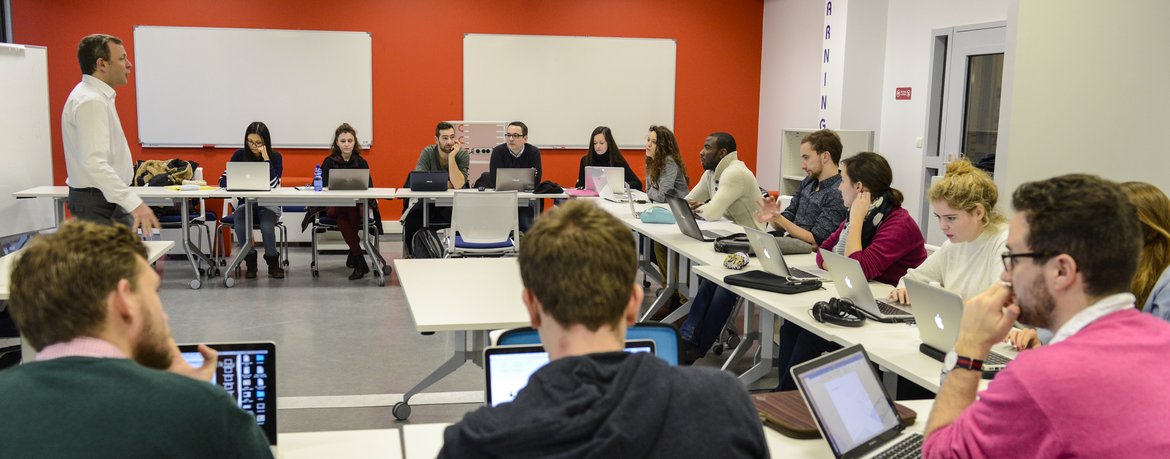How to Implement the Big Paper: Building a Silent Conversation Teaching Strategy in Your Classroom

Description
This discussion method utilizes writing and silence as tools to help learners explore a topic in depth. In a Big Paper discussion, learners write out their responses to a stimulus, such as a quotation or historical document. This process slows down learners’ thinking and allows them to focus on the views of others. It also creates a visual record of learners’ thoughts and questions that you can refer to later in a course. You can utilize this method both to engage learners who are not as likely to participate in a verbal discussion. Once they participate in this learning activity several times, learners’ comfort, confidence, and skill in using this tactic increases.
Implementation
- Select a Stimulus for Discussion: To start, choose the stimulus—the content that learners will respond to. A stimulus may consist of questions, quotations, historical documents, excerpts from novels, poetry, or images. Groups can all be given the same incentive for discussion, but more often, they are each given a different text related to the same theme. This activity works best when learners are working in small groups. Each group should receive a big piece of poster paper where they can write their comments. In the middle, place the stimulus that will be used to spark the learners’ discussion.
- Prepare Learners: Inform the class that this activity will be completed in silence. All communication is done in writing. Learners must be told that they will have time to speak in pairs and the big groups at a later time. Explain the instructions at the start so that they do not ask questions during the activity. Also, before the learning activity starts, the instructor must ask learners if they have questions, to minimize the chance that learners will interrupt the silence once it has begun. You can also remind learners of their task as they start each new step.
- Learners Comment on Their Group’s Big Paper: Each group receives a Big Paper, and each learner gets a marker or pen. Some instructors have each learner use a different color to make it easier to see the back-and-forth flow of a conversation. The groups read the text in silence. After learners have read, they are to comment on the content and ask questions to one another by writing on the Big Paper. This conversation must start on the topic of the text but can stray wherever the learners want it to. If someone in the group writes a question, another member of the group must address the question by writing on the Big Paper. Learners can draw lines connecting a comment to a particular question. Make sure learners know that more than one of them can write on the Big Paper at the same time. The instructor can determine the length of this step, but it must be at least 15 minutes.
- Learners Comment on Other Groups’ Big Papers: Still working in silence, learners leave their groups and walk around reading the other Big Papers. Learners can bring their writing utensils with them and can write comments or questions for thought on other Big Papers. Determine the length of time for this step based on the number of Big Papers and your knowledge of the learners.
- Learners Return to Their Group’s Big Paper; Silence Is Broken: The groups go back to their own Big Paper. They must view new comments written by their classmates. They can have a free verbal conversation about the content, their comments, what they read on other papers, and the comments their fellow learners wrote for them. At this point, you may ask learners to retrieve their journals and identify a question or comment that stands out to them.
- Discuss as a Class: Finally, debrief the process with the big group. Each conversation can start with a primary prompt. For example, “What did you learn from doing this activity?” This is the time to delve deeper into the content and use ideas on the Big Papers to draw out the learners’ plans.
Modifications
- Little Paper: With a Little Paper activity, the stimulus is placed in the center of a regular-sized piece of paper. Often, instructors select four to five different stimuli and create groups of the same size. Each learner starts by commenting on the stimulus on the Little Paper. Each paper is passed to the learner on the left after a few minutes. This process is repeated until all learners have had the opportunity to comment on every document. This learning experience is completed in silence, just like the Big Paper activity. Then learners review the Little Paper they had first, noticing comments made by their peers. Finally, small groups discuss the questions that stand out to them.
- Gallery Walk: The Big Paper activity can also be structured as a gallery walk. In this arrangement, Big Papers are taped to the walls or placed on tables, and learners comment on the Big Papers in silence, at their own pace. Sometimes, instructors assign learners, often in pairs or triads, to a particular Big Paper and then have them switch to the next one after five or ten minutes.





